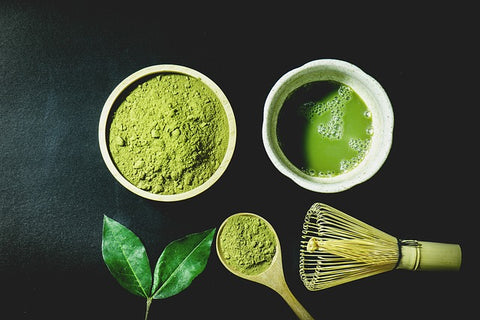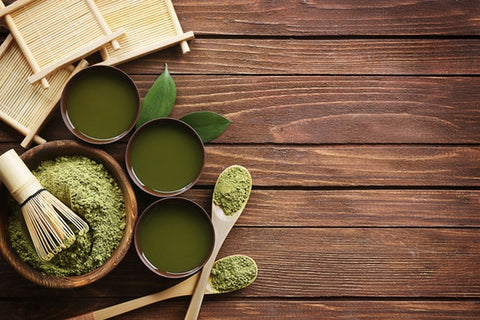
By Toni Sicola • November 5, 2019
Matcha tea isn’t your average steeped green tea. While it does come from the same Camellia sinensis plant, it’s very different.
The differences offer greater health benefits for consumers of all ages, especially seniors.
The health benefits of matcha tea for seniors are manyfold. You’ve likely read about high antioxidants in green tea that help ward off many types of cancer, but there’s actually a lot more to it than that. In fact, because matcha green tea is the whole plant ground into a fine powder rather than leaves in a tea bag that’s steeped and removed, you’ll get the nutritional benefit of consuming the whole tea leaf.
Most seniors are concerned about preventing chronic diseases like heart disease, cancer, obesity, and diabetes. Still other seniors are interested in looking younger for longer and pursuing anti-aging strategies in their diets and lifestyles to help keep them healthy, active, and looking their best. Matcha tea is the perfect ingredient to add to a healthy diet and lifestyle for seniors.
How Matcha Tea is Made
Matcha tea comes from the Camellia sinensis plant, the same plant used in regular green tea. In fact, matcha tea is sometimes called matcha green tea. The growing process in the last 20-30 days before harvest is one of the ways in which matcha is distinct from green tea.
Twenty to thirty days before harvest, matcha tea leaves are covered so that the sun is partially blocked. This added stress on the plants actually enhances the production of valuable nutrients: chlorophyll, amino acids, and antioxidants. Loaded with more phytonutrients, leaves become a darker green color and are ready for harvest.
Once harvested, growers remove the stems and veins and grind up the remaining plant matter into a fine powder for distribution and consumption.
To make matcha tea, you simply add this fine powder directly to water, stirring until it dissolves. The growing process and preparation give you a much more potent powerhouse of nutrition than standard green tea.

Health Benefits of Matcha Tea for Seniors
As we mentioned up top, matcha tea is a powerhouse of nutrients and can benefit just about everyone. But for seniors specifically, there’s a lot to take in. Matcha tea offers a host of antioxidants, amino acids, and beneficial phytonutrients to help seniors live their best lives.
Antioxidants
The term “antioxidants” is an umbrella term for a number of micronutrients available in various foods. Antioxidant literally means against oxidation. And in the case of the human body, antioxidants neutralize free radicals.
Without getting too deep into a science lesson on subatomic particles, free radicals are unpaired electrons that scavenge the body looking for something to pair with. The pairing makes them more stable but wrecks human tissue over time.
The damage to the cells in your body that free radicals cause is called oxidative stress. Free radicals and the resulting oxidative stress are associated with many human diseases, especially all diseases with an inflammatory component: obesity, diabetes, heart disease, cancer, Alzheimer’s, and more.
All sorts of dietary, medical, and environmental factors expose you to oxidative stress every day. This includes fried foods, alcohol, cigarettes or other tobacco smoke, pesticides, medicines, and air pollution. By eating and drinking food and beverages rich in antioxidants, you are arming yourself with the tools to counteract these daily exposures.
Matcha tea has a number of antioxidants, including a specific type of catechin called EGCG (epigallocatechin gallate). This nutrient is present in all forms of green tea but is especially potent in matcha. In fact, one study measured the difference and showed that matcha’s EGCG levels to be 137 times greater than regular green tea.
EGCG is a potent antioxidant that’s been the subject of a number of clinical trials. These studies examined its effects on blood pressure, LDL cholesterol levels, fat loss, and even cancer-fighting effects.
While more work needs to be done in this area, this research suggests that you’re on the right track when consuming EGCG.
Other trace minerals, vitamins, and phytonutrients combine to make matcha tea greater than the sum of its parts. These additional nutrients include vitamins A, C, E, K, and the B-complex, in addition to selenium, chromium, zinc, and magnesium.
Brain Health
In addition to the jam-packed list of phytonutrients, seniors can also benefit from the amino acids in matcha tea. L-theanine is of particular interest. In fact, green tea is the only place you can find L-theanine in plants.
Studies show that L-theanine significantly increases alpha waves in your brain. Usually associated with a state of meditation and yoga, alpha waves create a deep sense of calmness and clarity in your mind and body. And this is without compromising your sense of alertness.
L-theanine also increases the activity of the neurotransmitter GABA in your brain. GABA is your body’s natural anti-anxiety chemical. Seniors tend to report experiencing more anxiety than their younger counterparts.
This may be because, as you age, you begin to experience more loss, more chronic pain, and more illness. Anxiety affects more than 40 million people in the US every year, many of whom are seniors. So by adding matcha tea into your daily routine, you’ll be helping not just your physical, but your mental health as well.
In fact, some studies show that drinking matcha tea can help you reduce your risk of Alzheimer’s disease. This is both because of the catechins (EGCG) and the L-theanine, although more studies need to be done to confirm the latter.
The chemical theophylline is also present in all green tea (more so in matcha). Theophylline, like caffeine, is a stimulant naturally occurring in tea. But theophylline provides a very different type of energy than the caffeine found in coffee. It releases more slowly, providing sustained energy without the jitters and anxiety sometimes associated with coffee.
Liver and Kidney Protection
Likely due to the chlorophyll content of matcha, quite a few studies have shown an association between matcha tea and improved liver and kidney health. Chlorophyll helps bring more oxygen into your body and promotes detoxification.
Since the liver and kidneys are both detoxifying organs, it would make sense that matcha aids in the detoxification process and pumps up the health of these organs. Both animal and human studies have shown that green tea consumption helps with damage to the liver and kidneys.
The standard American diet (SAD) is among the leading causes of chronic disease in America, due to its nutrient-poor, high-calorie ingredients. By cleaning up your diet and drinking matcha tea, you can enhance your health in more ways than one.
Anti-Aging
All of the nutrients in matcha are not only good for your health, but they’re also good for your energy and appearance too. As seniors age, health concerns are certainly top of mind. But so is weight, appearance, and energy levels.
Signs of aging, like weight gain, wrinkles, and waning energy are all things that seniors think about. The good news is that matcha tea has you covered. The various constituents in matcha, like EGCG, L-theanine, theophylline, and the many vitamins and minerals all work together for anti-aging benefits.
Skin Health
Antioxidants like EGCG help protect your skin against the breakdown of collagen that happens with aging. Collagen is the most prevalent protein in the human body and is a major component in all connective tissue. This includes your skin.
When collagen breaks down, skin thins, sags, and wrinkles. These effects speed up when your body is exposed to oxidative stress and free radicals. The antioxidants in matcha can help protect your skin from signs of aging by blocking free radical damage and promoting the production of healthy cells.
Energy Levels
The L-theanine and theophylline found in matcha green tea support healthy energy levels throughout the day. As we mentioned before, theophylline provides a more sustained stimulating effect than the caffeine found in coffee.
This isn’t to say that matcha tea doesn’t have caffeine. On the contrary, it actually has a lot more caffeine than regular green tea and about half as much as one shot of espresso. That being said, the L-theanine in matcha prolongs the positive effects of the caffeine and theophylline, providing lasting energy, alertness, and acuity throughout the day.
When seniors feel energized, they’re a lot more likely to stay active, and activity is among the most important things you can do for yourself to stay young. Finding the time and energy to go on a daily walk, hit the gym, or do physically demanding chores like gardening or mowing the lawn will keep you feeling and looking younger for longer.
It’ll also help you combat the slowing metabolism that comes along with getting older.
Fat Loss
Matcha tea has been shown to aid in glucose metabolism, leading to fat loss. Of course, drinking tea won’t automatically mean that you’ll lose weight. But adding matcha tea to a healthy lifestyle could help you aid your weight loss efforts.
The sustained energy you get from the slow release of caffeine will help you keep moving, in addition to helping rev up your metabolism.
And EGCG in combination with this caffeine boost has been shown in clinical trials to promote significant weight and fat loss.
Your Daily Dose of Matcha Tea
Matcha green tea may not be a magical potion, but it’s about as close to the fountain of youth as you can get. With orders of magnitude more beneficial phytonutrients than traditional green tea, black tea, or coffee, it’s hard to justify passing it up as part of your morning routine.
When it comes to getting older, it’s the little behaviors you can do every day to help stave off signs of aging that might slow you down and affect your quality of life. By adding a bit of matcha tea into your daily diet, you’ll be dosing yourself with antioxidants, chlorophyll, vitamins, minerals, L-theanine, and a form of caffeine that doesn’t leave you feeling jittery and anxious.
Do yourself a favor and give matcha tea a try. It’s easy to brew: simply add it to hot water and stir. Some types of matcha even dissolve well in cold water.
You’ll find that adding matcha to your routine will give you a sense of wellbeing and sustained energy that you might not realize you’ve been missing.
We offer several blends of matcha green tea with other beneficial organic superfoods. They are some of our most popular and highly loved products. Try them today without the risk of not liking them. You’ll get your money back if you don’t like them thanks to our 100% money back guarantee.





